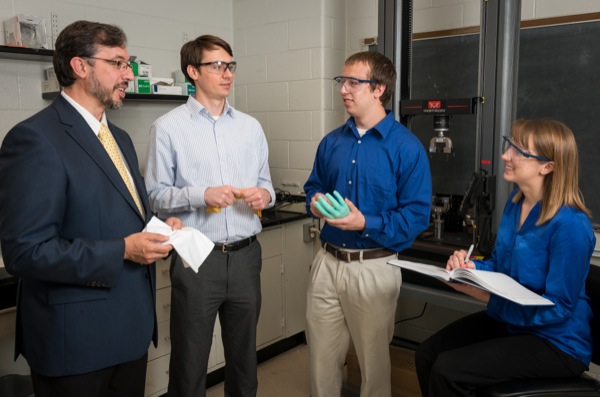UD spin-off company is working to develop puncture-resistant surgical gloves
8:29 a.m., May 13, 2014–Health care workers in the United States suffer an estimated 385,000 needlestick injuries per year, according to the Centers for Disease Control.
Up to 90 percent of these injuries occur in the hand and can expose surgeons, nurses and other health care staff to infection from blood-borne pathogens such as HIV and hepatitis B and C. The average cost of a needlestick injury to a hospital is $2,500.
Researchers at STF Technologies LLC, a spin-off company from the University of Delaware, are working to develop a puncture-resistant surgical glove, according to the company’s co-founders Norman Wagner and Richard Dombrowski.
STF Technologies grew out of federally funded research by Wagner, the Alvin B. and Julia O. Stiles Professor of Chemical and Biomolecular Engineering at UD. Wagner co-invented shear thickening fluid (STF) armor technology — a smart material that can change from a liquid to a solid in response to ballistic and puncture threats — in collaboration with Eric Wetzel at the U.S. Army Research Laboratory in Aberdeen, Maryland.
Under mechanical stress or “shear,” tiny ceramic particles in the STF are driven together, causing the material to behave as a solid. Adding this STF to a fabric creates a nanocomposite material that can harden rapidly to form a temporary protective shield before becoming flexible again. The technology is already under development for use in multi-threat body armor employed to protect soldiers, police and first responders.
Now, with funding from the National Science Foundation’s Small Business Technology Transfer (STTR) program, Wagner’s research team will apply the STF technology to early product development and testing for puncture-resistant surgical gloves designed to protect medical professionals in orthopedic, trauma and general surgical specialties.
“Surgical gloves are a billion-dollar market and despite the high number of needlestick injuries to the hand, there is no effective puncture-resistant medical glove on the market,” said Wagner.
Typical latex and nitrile gloves, for example, offer minimal puncture protection while other proposed puncture protection technologies use hard materials such as ceramics, metals or woven textiles that are stiff and expensive, rendering them impractical in a surgical setting.
“Our concept is to develop a cost-effective glove that protects against accidental needlestick injury while providing medical professionals the dexterity and comfort to effectively do their work,” he added.
The STF Technologies team includes Lauren Piascinski, a registered nurse and UD alumna who also is a graduate nursing student, and Erik Hobbs, a UD undergraduate chemical engineering major who was hired as a laboratory assistant.
Piascinski will gather data about specific types of needles and needlestick injuries that are prevalent in these fields. As a nurse herself, she also can provide the product engineers with a perspective on the product’s advantages and disadvantages. Dexterity and comfort of the gloves will ultimately be evaluated through a review with nurses and surgeons.
Wagner and Dombrowski worked with UD’s Office of Economic Innovation and Partnerships to apply for patents to protect the use of STF-textile composite materials. In addition, prior to completing the NSF STTR grant proposal, Dombrowski attended a University-sponsored seminar on how to write an STTR/SBIR grant through OEIP’s Small Business and Technology Development Center.
“STF Technologies LLC is an example of the technology transfer that can emerge from a tier-1 research university like the University of Delaware with the proper resources and support,” said Dombrowski, a UD chemical engineering alumnus and associate scientist who specializes in developing and patenting advanced protective materials and products.
“OEIP is providing resources to researchers and in our case, those resources have come back to pay dividends — both for STF Technologies and for the University.”
Under the STTR program, more than $67,000 in federal funding comes directly to the University.
Other applications for the technology could include advanced personal protective equipment for industrial work.
Delaware companies with a UD connection that currently have or previously received STTR/SBIR funding include:
- Elcriton Inc., a UD spin-off company born from research work in the laboratory of Eleftherios (Terry) Papoutsakis, Eugene du Pont Chair of Chemical and Biomolecular Engineering.
- PAIR Technologies LLC, a UD start-up founded by John Rabolt, Karl W. and Renate Boër Professor of Materials Science and Engineering (MSEG) and professor of biomedical engineering, and Bruce Chase, a fellow MSEG faculty member and former DuPont scientist.
Article by Karen B. Roberts
Photo by Evan Krape

